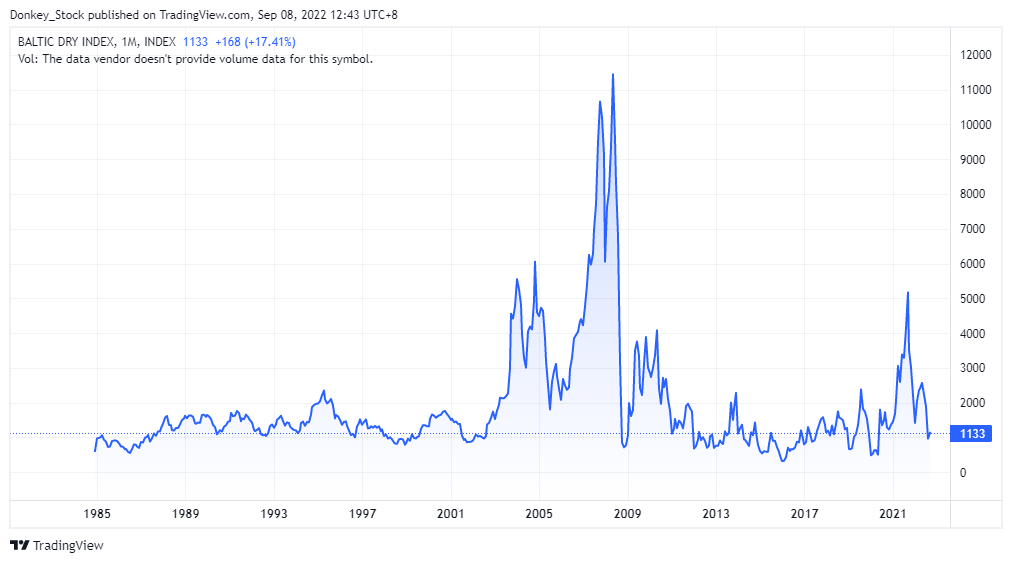What is BDI
DonkeyStock
Publish date: Tue, 13 Sep 2022, 11:35 AM
Baltic Dry Index, BDI, is the index that measures the logistics cost for raw materials.

The Baltic Dry Index (BDI)
The Baltic Dry Index (BDI) is a shipping and trade index created by the London-based Baltic Exchange. It measures changes in the cost of transporting various Dry Bulk Commodities, such as coal and steel.
The Baltic Exchange calculates the index by assessing multiple shipping rates across more than 20 routes for each of the BDI component vessels. Analyzing multiple geographic shipping paths for each index gives depth to the index's composite measurement.
Dry bulk commodities are usually divided into two categories: major bulks and minor bulks. Some examples of major dry bulk commodities include iron ore, coal, and grain. These major bulks account for nearly two-thirds of global dry bulk trade. Minor bulks include steel products, sugars, cement, and cover the remaining one-third of global dry bulk trade.
Coal, along with iron ore, is one of the most traded dry bulk commodities by volume in the world. Countries most involved in the importation of coal for their primary energy and electricity needs are India, China, and Japan. Grain is another major cargo in terms of seaborne dry bulk trade and accounts for a chunk of the total dry bulk trade worldwide.
The Baltic Dry Index is a composite of four sub-indices that measure different sizes of dry bulk carriers or merchant ships: Capesize, Panamax, Supramax, and Handysize.
Capesize
Capesize boats are the largest ships in the BDI with 100,000 deadweight tonnage (DWT) or greater. The average size of a Capesize ship is 156,000 DWT.
This category can also include some massive vessels with capacities of 400,000 DWT. Capesize ships primarily transport coal and iron ore on long-haul routes and are occasionally used to transport grains. They're too large to cross over the Panama Canal.
Panamax
Panamax ships have a 60,000 to 80,000 DWT capacity, and they're used mostly to transport coal, grains, and minor bulk products such as sugar and cement. Panamax cargo ships require specialized equipment for loading and unloading. They can barely squeeze through the Panama Canal
Supramax
The smallest vessels included in the BDI are Supramaxes, also referred to as Handymaxes (or Handysize). These ships have a carrying capacity of 45,000 to 59,999 DWT. They're sometimes Although they're close in size to Panamaxes, Supramaxes normally have specialized equipment for loading and unloading, and they're used in ports where Panamaxes cannot.
Handysize
Handysize vessels are smaller vessels with a carrying capacity generally between 10,000 and 40,000 DWT. Due to their smaller size, Handysize ships can access ports of all sizes.
Source:iSquare
More articles on Stock Infographics
Created by DonkeyStock | Jun 05, 2024
Created by DonkeyStock | May 28, 2024
Higher offer price for MPHB Capital Bhd ?
Created by DonkeyStock | May 27, 2024
DC Healthcare Bhd has delivered a worsening financial result
Created by DonkeyStock | Jan 04, 2024
Property investing by these visionary Singapore-based companies
Created by DonkeyStock | Jan 03, 2024
Discover the factors behind this surge, the challenges faced by top cocoa producers, and the ripple effect on chocolate manufacturers
Created by DonkeyStock | Aug 15, 2023
Created by DonkeyStock | May 03, 2023
Companies listed on Bursa Malaysia with an outstanding quarter results for the month of Apr 2023.





















